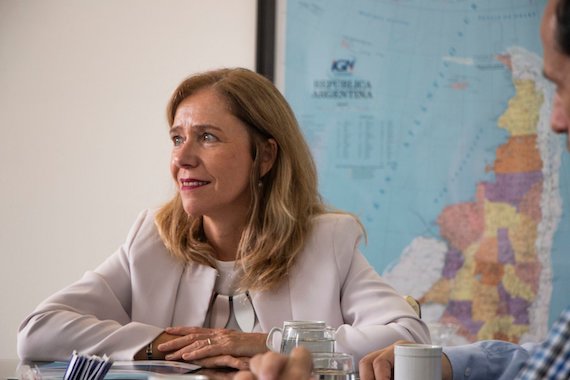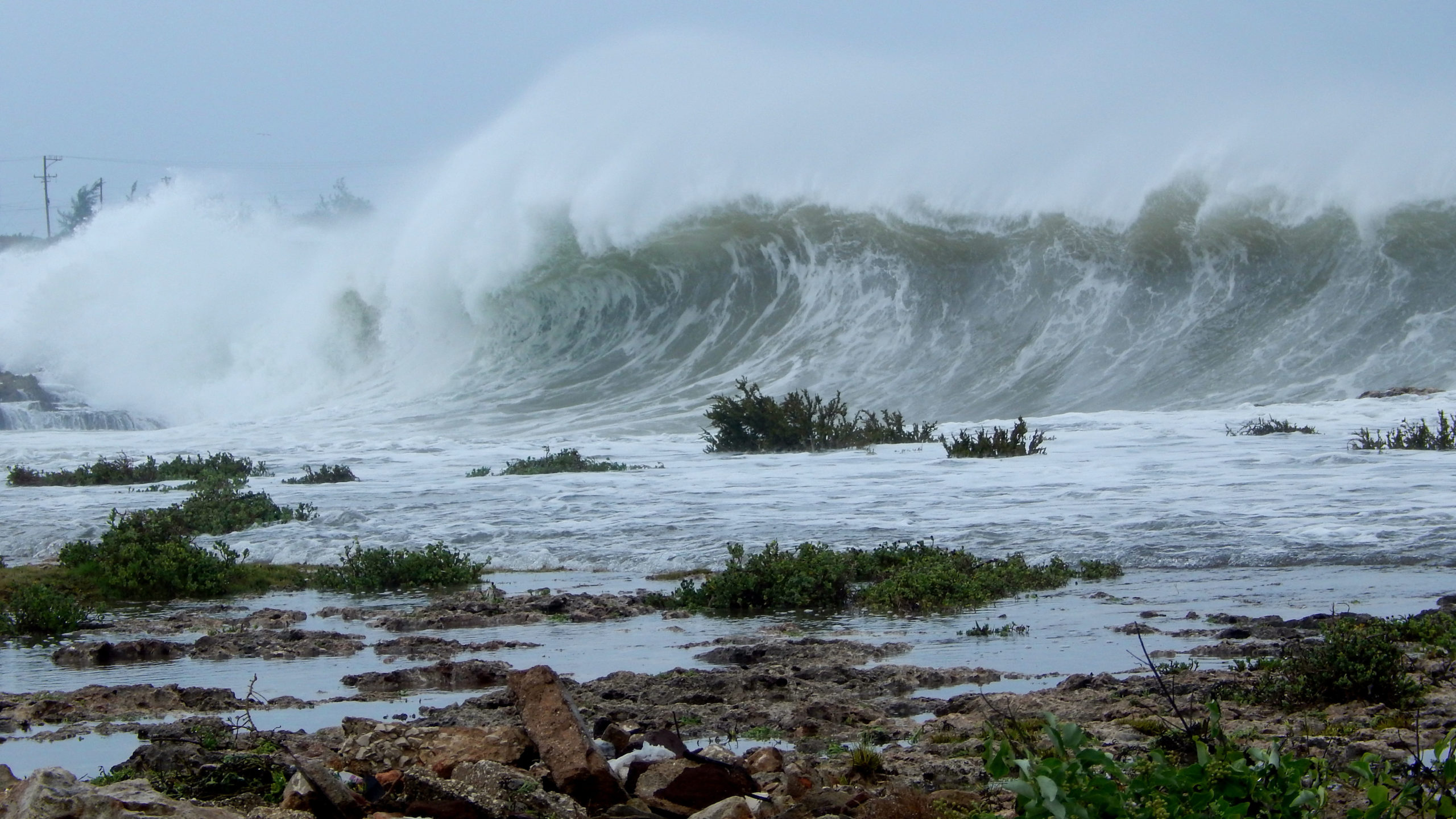Celeste Saulo, set to be the first female Secretary-General of the World Meteorological Organization, talks climate action and leadership
Saulo already held the distinction of being the first woman to serve as director of Argentina’s National Meteorological Service (SMN), a role she has held since 2014. In 2018, she became the first woman to hold the post of second vice-president at the World Meteorological Organization (WMO) and rose to become its first vice-president only a year later – once more being the first woman in the position.
On 1 June, Saulo received this ovation as she made yet more history, becoming the first woman to be elected Secretary-General of the WMO, a role she will take up in January 2024, overseeing a United Nations agency that has in recent years become an ever more necessary and authoritative voice on the state of the atmosphere and climate change.
Born in Argentina and trained in meteorology and atmospheric sciences, during a long career Saulo has conducted important research into the South American monsoon system, as well as meteorological issues in energy production, agriculture and early warning systems. In conversation with Diálogo Chino, she discussed her goals for the WMO, the changes needed to make a greater contribution to climate action and the importance of having more women in leadership roles in the context of climate crisis.
Diálogo Chino: How do you feel after your appointment to lead the WMO?
Celeste Saulo: Extremely honoured, flattered, grateful and, obviously, an enormous responsibility. It was a huge shock – I had worked for it, but it was still something that surprised me. Part one was being chosen, then comes the most important part: working and implementing what you set out to do. The challenge is enormous, but I am very happy and proud.
Why do you think it took so long for a woman to become a leader of the WMO?
The reality is that there are far fewer opportunities for women, because to be “known” at the WMO, you have to be a director of a [national] meteorological service. So it depends on countries having the will to elect women for there to be more women on the WMO stage. During this campaign, I came across women being elected as directors of meteorological services for the first time in their history. I came across very different parts of the world where they said to me “I am the first woman” – and that was fabulous.
What will be your main objectives at the helm of the organisation?

Argentine meteorologist Celeste Saulo hopes to boost collaboration on climate action between UN agencies when she takes office as the World Meteorological Organization’s new Secretary-General in 2024 (Image: Argentina National Meteorological Service)
Firstly, to implement the agenda voted for by members at the recent WMO congress. Priorities include the implementation of the Early Warnings For All Initiative: although launched a year ago, it still has a long way to go. In addition, the strengthening of meteorological information-gathering networks in countries, for which extra-budgetary resources must be sought. The other objective is to broaden the scope of observation networks to include the monitoring of greenhouse gases and the cryosphere.
What will you contribute to this existing agenda that has already been voted on?
If I were to add a personal touch, it would be to work closely with the members. An early warning system is not just a technical thing that you put in place as if it were nothing. Cultural values, risk perception and vulnerabilities are so varied across the planet that it would be naïve and unprofessional of me not to acknowledge that this requires work in each territory. It requires work with each member. An early warning system for a population in Jujuy [northern Argentina] is not the same as for a population in Patagonia [in the country’s south]. It is not the same for an urban population as for a rural one.
UN Secretary-General António Guterres has set a target for all the world’s inhabitants to be protected by early warning systems by the end of 2027. What opportunities and challenges do you see in this?
The huge opportunity comes from a call from someone with a high level of impact, telling the world that early warning is important as a climate change adaptation tool. Countries need to understand that this translates into strengthening their meteorological and hydrological services – this link is not always made, and that is the part that falls to WMO. Here, I see an opportunity to work to strengthen meteorological and hydrological services, not because they need to be strengthened per se, but because they play a key role in the adaptation to climate change of countries, their populations and productive systems.
This is a huge opportunity for a positive feedback loop but, at the same time, a huge challenge, because we know that the level of development of meteorological services is completely uneven. The WMO has the challenge of trying to narrow the gaps between the most and least developed services.
How do you see the Latin American region responding to the increasingly intense impacts of climate change?
On average, as a region, I see it doing well, of course with enormous room for improvement. I would separate the island states that have a different set of problems. We have an advantage that few regions have: we speak the same language or almost the same language. That is a strength, in my opinion, that is underexploited.
It’s now 73 years since the WMO was created, and the first UN climate change conference was held in 1995. How do you see climate action today? Have we made enough progress, and if not, why?
Science and technology have come a long way. When there are decisions that are sensitive to economies and economic interests, that is where the issue becomes very complex. I regret that, as scientists, we have not been able to convince decision-makers how urgent it is that they take the relevant action. I am talking about states, but it is also necessary to talk about global companies that are larger in size than some states. What responsibility are we demanding from these players? It is not entirely clear to me. What is clear is that it is insufficient. That is where we are failing, and it worries me.
On the one hand, we have science and technology with its advancement and intention to improve, to do what needs to be done. On the other hand, there are the decision-makers who, driven by economic interests, do not manage to bring about the strong actions to make changes happen.
How could the WMO contribute better or differently to climate action?
I hope to be able to work better in coordinating with other UN agencies, in order to make my voice as strong as possible. In Argentina, I tried to move the meteorological service out of the limited space it had, to get it to talk to ministries and agencies, and I think the same should be done with WMO, as its space can be a bit narrow given the importance of the subject it deals with. There is complementarity here – it’s not that we have to take over the agenda of other agencies, but that we have to be able to work better collaboratively. I also hope to involve more actors, such as companies and non-governmental organisations. We must join forces, not in a disorganised way but with a purpose, to drive climate action.
Why is it necessary to have more women in leadership positions in the context of the climate crisis?
Because we bring a different perspective. Any crisis must be addressed with the understanding that there are diversities. If it is dealt with in a patriarchal way, only part of these needs will be met. If we broaden the perspective to include a gender perspective, concern for children and older people, and people with disabilities, we will have a much more comprehensive reaction to the climate crisis that can incorporate all those who exist, not just men. If we can’t think like that, it’s not going to work. Women have – or at least, I think I have myself – a broader view that is able to capture this diversity.
What message would you give to young women who may be inspired by your success?
Listen to your instinct, passion and taste, and follow it. Never do it alone. Networks of any kind are important: family, friends, institutions. If you choose to start a family, don’t panic. In my case, for several years my family was far above my career, but I didn’t abandon my professional development, I continued. I went into a kind of plateau where I kept going. Then I picked it up again with more energy.



 © 2026 All Rights Reserved
© 2026 All Rights Reserved